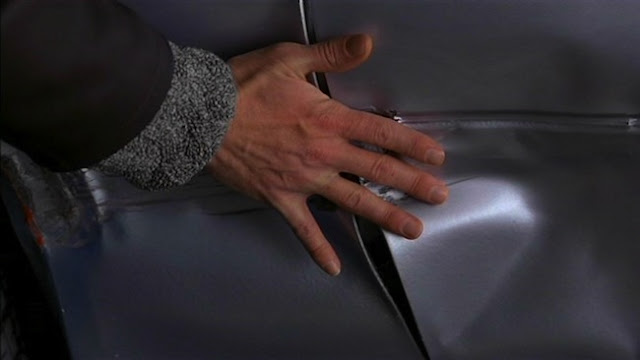My big fat night
I'm at a theater behind the American consulate, paying my six euro to see My Big Fat Greek Wedding. In Greece.
Outside, anarchists organize a protest.
About a hundred hold black flags and A-symbols on Tsimiskis Street in front of the same complex. "Front or back?" the middle-aged ticket seller asks in Greek. "Back," I say. I want to see how this crowd greets this Chicago-set phenomenon shot in Toronto, about the Greek-American diaspora, written by a woman from Winnipeg.
It's the sixth week of its run, the night before the International Thessaloniki Film Festival opens. The seats are reserved, and like with most movies in this movie-mad city, it's sold out. I return to the street, the city's Michigan Avenue. Shoppers file out of Benetton and Marks & Spencer. The protest is over the arrest of an alleged terrorist; the issues go back to the 1970s and the era of American-supported military junta. In English, I ask one of the cops, who's wearing black head-to-toe motorcycle leather, what's up, and he shrugs and answers in my language, "Another regularly-scheduled spontaneous demonstration."
At the concession stand, I buy a Heineken before taking my seat. As in every language, subtitles simplify. The occasional words in Greek get more laughter than the flatly translated jokes. But the room is with the movie. My local friends call it "My Big Fat Wedding," taking "Greek" for granted. The biggest buzz is whenever Michael Constantine is on the screen, the blustering, ineffectual father, a stereotype beloved of American sitcoms, but even more so among these Greeks from 15 to 50. This is laughter, loving: this man whose life is good only because of the women who surround him seems a tremendously familiar figure.
Back in modern Greece, outside the prefab gags about Greek-American life, I turn off Aristotle Square behind the shopping mall. A stocky policeman in full riot regalia leans against a gray marble wall like a shadow left by a nuclear flash. He listens to the crackling radio. A line of black extends up the block, the back entrance of the complex covered, two dozen cops cracking jokes. Cigarette smoke coils. I catch the eye of a woman with red hair. She stares at me from beneath her uplifted Lexan visor. I smile. She blows cigarette smoke toward me. Figures filter between the police, leaving another movie. There's an internet cafe one door past. Inside are ranks of boys of ten and eleven and twelve all locked into their first-person shooter games. "Malacca!" one yells, and then another twerpy voice squeaks out the same familiar swear. A gorgeous night, the real world: a big fat Greek tapestry.
[Published in a different form in Newcity, 4 December 2002.]
Outside, anarchists organize a protest.
About a hundred hold black flags and A-symbols on Tsimiskis Street in front of the same complex. "Front or back?" the middle-aged ticket seller asks in Greek. "Back," I say. I want to see how this crowd greets this Chicago-set phenomenon shot in Toronto, about the Greek-American diaspora, written by a woman from Winnipeg.
It's the sixth week of its run, the night before the International Thessaloniki Film Festival opens. The seats are reserved, and like with most movies in this movie-mad city, it's sold out. I return to the street, the city's Michigan Avenue. Shoppers file out of Benetton and Marks & Spencer. The protest is over the arrest of an alleged terrorist; the issues go back to the 1970s and the era of American-supported military junta. In English, I ask one of the cops, who's wearing black head-to-toe motorcycle leather, what's up, and he shrugs and answers in my language, "Another regularly-scheduled spontaneous demonstration."
At the concession stand, I buy a Heineken before taking my seat. As in every language, subtitles simplify. The occasional words in Greek get more laughter than the flatly translated jokes. But the room is with the movie. My local friends call it "My Big Fat Wedding," taking "Greek" for granted. The biggest buzz is whenever Michael Constantine is on the screen, the blustering, ineffectual father, a stereotype beloved of American sitcoms, but even more so among these Greeks from 15 to 50. This is laughter, loving: this man whose life is good only because of the women who surround him seems a tremendously familiar figure.
Back in modern Greece, outside the prefab gags about Greek-American life, I turn off Aristotle Square behind the shopping mall. A stocky policeman in full riot regalia leans against a gray marble wall like a shadow left by a nuclear flash. He listens to the crackling radio. A line of black extends up the block, the back entrance of the complex covered, two dozen cops cracking jokes. Cigarette smoke coils. I catch the eye of a woman with red hair. She stares at me from beneath her uplifted Lexan visor. I smile. She blows cigarette smoke toward me. Figures filter between the police, leaving another movie. There's an internet cafe one door past. Inside are ranks of boys of ten and eleven and twelve all locked into their first-person shooter games. "Malacca!" one yells, and then another twerpy voice squeaks out the same familiar swear. A gorgeous night, the real world: a big fat Greek tapestry.
[Published in a different form in Newcity, 4 December 2002.]
